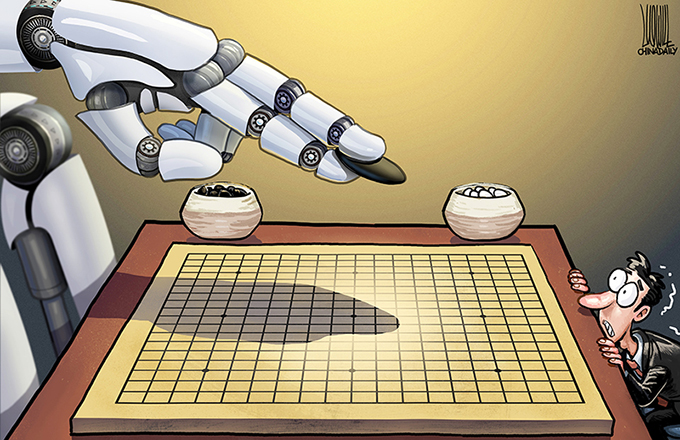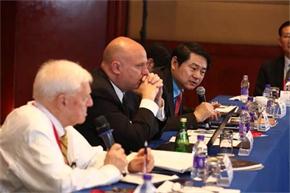Xi's philosophy for engaging with the world embodied in initiative
The Belt and Road Forum for International Cooperation will be held on Sunday and Monday. How does the initiative express President Xi Jinping's political philosophy with respect to China's foreign and domestic policy?
Xi's foreign policy is to engage the world, safeguard China's core interests, encourage mutual economic development, and facilitate China's emergence as a great power. Xi's domestic policy stresses reform, rule of law, and the realization of an all round moderately prosperous society, which requires the alleviation of extreme poverty.
Here's how the Belt and Road Initiative enhances the four pillars of China's foreign policy.
A multi-polar world has long been a cornerstone of China's foreign policy, which opposes domination by one or two superpowers. The Belt and Road Initiative engages more than 60 countries along multiple land and maritime routes and exemplifies a multi-polar world.
Peaceful development is China's watchword. It has vowed that no matter how powerful the country becomes, it will never seek domination. The Belt and Road projects are founded on mutual cooperation, shared development and joint construction irrespective of the size or power of the host country.
People-to-people communications are an integral part of the Belt and Road Initiative: multi-channel, multilevel exchanges between peoples to promote mutual understanding. Examples include sister cities, cultural activities, non-governmental organizations, and public diplomacy.
A "community of shared future" is how Xi epitomizes the dreams of diverse peoples in common pursuit of peace and development. In this context, the 2,000-year history of exchanges along the ancient Silk Road provides precedence that different countries, races, religions, beliefs, political systems and cultural backgrounds can achieve peace and share the fruits of their interactions-provided they persist in seeking common goals and mutual trust, equality and mutual benefit, and tolerance and mutual learning.
The Belt and Road Initiative will be successful to the extent that China's principles of domestic development can be adopted and adapted by other developing countries according to their own conditions. Xi's overarching principles for guiding China's domestic transformation are innovation, coordination, greenness, openness and sharing.
How does each relate to the Belt and Road Initiative?
Large-scale infrastructure projects require structural innovation, especially in their financing and investment robustness. (The Belt and Road projects must be financially viable; they are not foreign aid.) The Asian Infrastructure Investment Bank, initiated by China to facilitate projects, is itself a major innovation.
For each Belt and Road project, diverse components, such as the local government, project management, international financing, and foreign and domestic constructing companies must be coordinated so they work together.
As developing countries are more concerned about economic development than environmental protection, the short-sighted move of shipping off polluting industries to them should be guarded against. If Belt and Road projects pollute host countries, local populations will come to resent China. Environmental protection and green development are essential.
China's spirit of openness, as well as its opening-up policy catalyzed the country's economic development. This same spirit and policy can energize countries along the Belt and Road while respecting local cultures and conditions. But what worked in China, if transplanted wholesale, will likely not work elsewhere. The challenge for developing countries is to adapt what makes sense for their own conditions.
Sharing is the essence of the Belt and Road Initiative. It is the proper spirit for all human beings and it is essential for maintaining global stability. Inequalities are a primary cause of instability. Shared development is as much a matter of transferring experience as it is of transferring money.
Just as these five major development concepts are transforming China's society and rebalancing China's economy, the Belt and Road Initiative can transform the developing world's infrastructure and rebalance the entire global economy.
China cannot aspire to global leadership by means of power alone. Economic and military strength, while necessary, are not sufficient. There must also be amoral or ethical arc to China's rise, and this includes Belt and Road projects. China, as Xi asserts, should "balance justice and benefits, stress faithfulness, value friendship, carry forward righteousness, and foster ethics."
There will be challenges: unforeseen events that China will have to handle with sensitivity. But can China demonstrate moral as well as economic leadership?
The author is a public intellectual, political/economics commentator, and international corporate strategist.

























